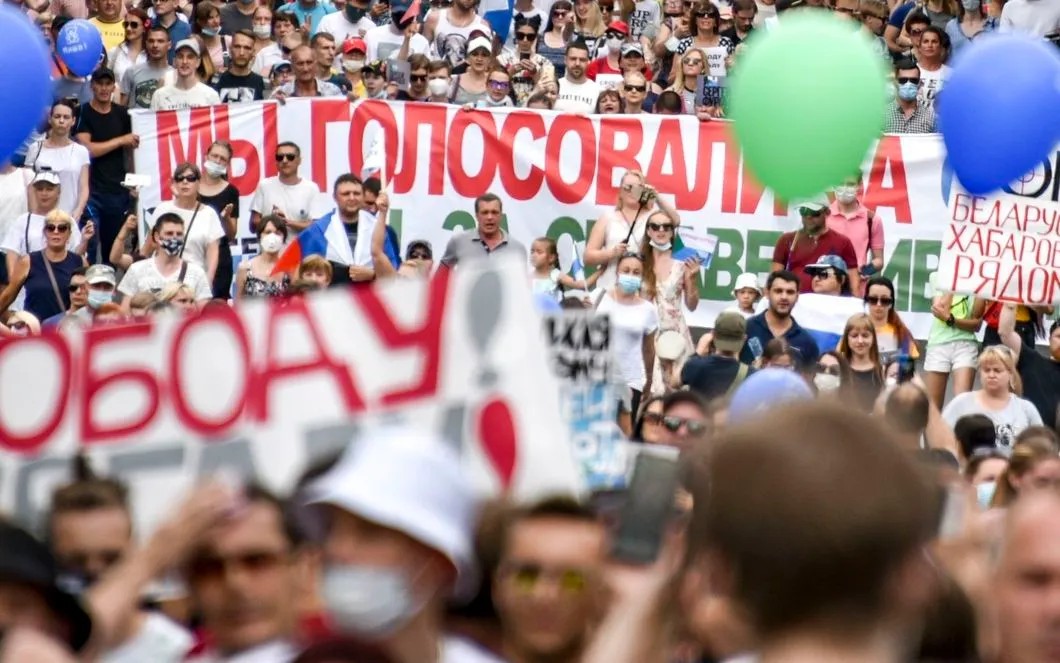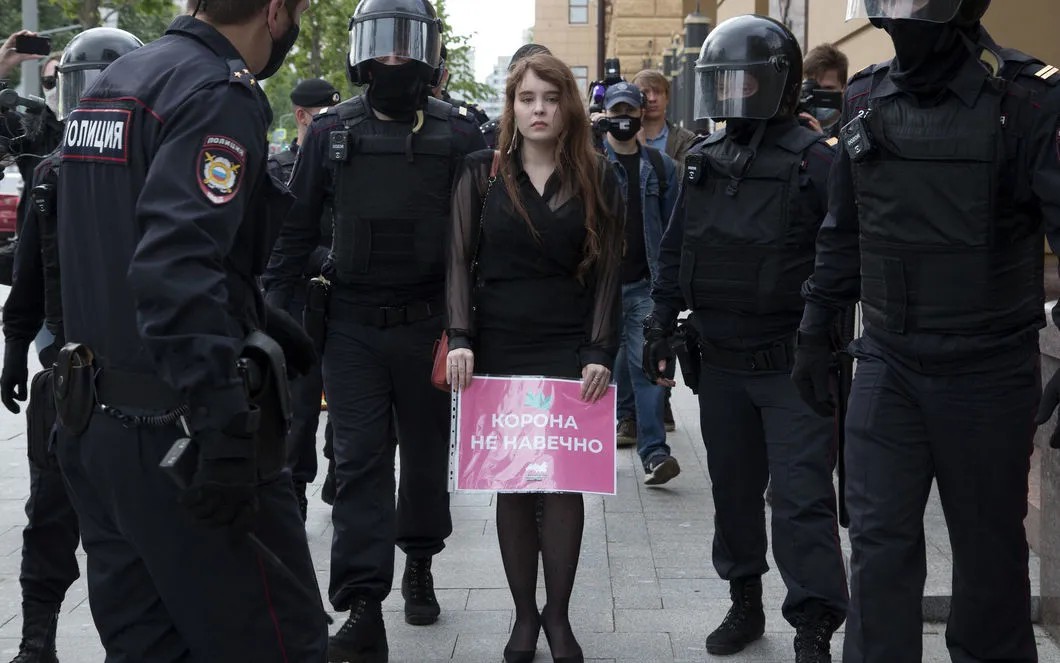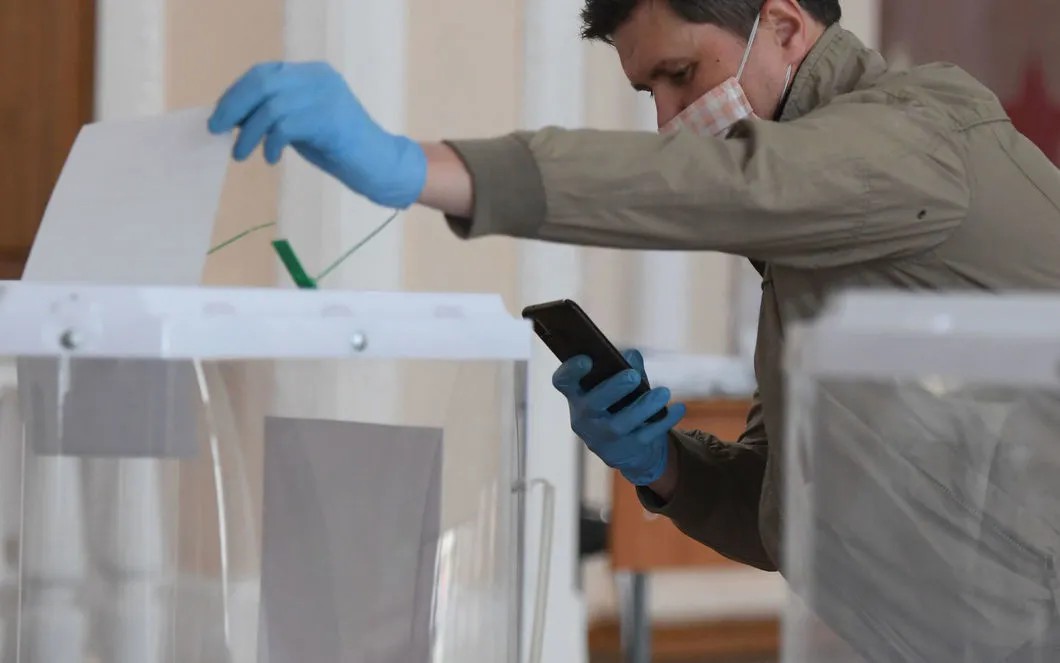This Week’s Highlights
As Russia’s Far East uprising keeps swelling, we investigate how trustworthy is the criminal case against the local governor and what could have triggered his arrest; we explain how Russian authorities keep disassembling key environmental protections; plus, we publish a new investigation exposing the depth of systemic police brutality in Russia.
Want to get the full story? Click the links below for full-length articles in Russian.
The Criminal Case Against Renegade Khabarovsk Governor, Explained
Protests in the far east city of Khabarovsk have swelled for the third week, with some unprecedented 90,000 people taking to the streets to demand the release of governor Sergei Furgal. He is arrested on what critics say are politically motivated chargeslinked to a series of murders 15 years ago. We fact-check Furgal’s business past and look into who the governor's arrest could have benefited.
FIRST, PROSECUTORS INFLATE FRUGAL’S INFLUENCE.Investigators say in 2004-2005, city and regional prosecutor's offices were all involved in covering up for Furgal in the cases of four murders of his business foes. But our investigation finds it highly doubtful that a 35-year-old metal dealer who previously worked as a neurologist 700 kilometers from Khabarovsk could have had that kind of influence.
SECOND, MURDER CHARGES ARE LIKELY A SMOKESCREEN.Specifically, we looked into an ongoing attempt of Putin-linked businesspeople to execute a hostile takeover of a plant partially-owned by the Furgal family. It might serve as a better explanation for Furgal’s arrest.

THIRD, ENTER PUTIN FOLKS.In 2016, Furgal’s wife Larisa Starodubova partnered with a Putin-linked businessman to buy out a dying metallurgy plant - the only steelmaking plant in the entire Far East. That person is Pavel Balsky, who sat on the board of directors of SMP bank, owned by Putin's friend Arkady Rotenberg. Lately, the business started making good profits. Balsky launched an aggressive consolidation of the plant’s assets.
FOURTH, SUSPICIOUS TIMING.Recently, Balsky secured the ownership of three-quarters of the plant after another major stakeholder got jailed in the case of Furgal-connected murders. It cleared the way for Balsky’s final consolidation push just two days before Furgal’s arrest. Now, it would be easy for Balsky to take over the 25% of the company that still belongs to the Furgal family.
GET OUT, BABYLON. Last week Putin installed a Furgal’s party mate, Moscow-based Mikhail Degtyarev, as interim governor. The move fueled more protests. They now adopted the “Get out, Babylon” slogan — a reference to a song by Russian rock-legend Boris Grebenshchikov, which has anti-imperialist undertones. Our politics editor Kirill Martynov writes that Babylon here is Moscow, a narcissistic entity devouring the rest of Russia. The motto sends a clear message: locals want Moscow to get out the far east and allow for self-governance. It’s a message that Putin hasn’t gotten so far, which is why his appointment of the Moscow-official has backfired.
Read our investigation into Furgal’s businesses here and Kirill Martynov op-ed here.
Russia Scraps Baikal Protection
Amid the country’s environmental degradation, the Kremlin keeps crusading against remaining ecological protections. This week we explain new laws set to cancel the conservation status of the territories surrounding the UNESCO World Heritage-listed Lake Baikal.
LICENSE TO FELL. The new laws allow authorities to rezone forest lands, bypass state environmental appraisals for any projects linked to the modernization of transport infrastructure and increase the throughput of the nearby major Baikal-Amur and Trans-Siberian railways. Simply put, they give authorities the green light to cut down as much forest as they want and make more money on often corrupt state tenders.
PUBLIC SHUT OUT.Greenpeace Russia expert Mikhail Kreindlin denounced the bill, stating that environmental appraisals are the only form of environmental evaluation that’s enshrined into law. These appraisals ensure that authorities must inform citizens on developments planned for their territory and allow them to have a say on these decisions. New law cancels the need for public hearings.

IN PUTIN’S HANDS. The Ministry of Natural Resources also appears to be proposing to scrap a ban on economic activities along the shores of Lake Baikal. It will offer a free pass for investment projects implemented by the federal government or on Putin’s orders, bypassing the approval by the local population. Environmental organizations, including Rivers Without Borders, have urged the Ministry against adopting these measures.
IN DANGER OF BEING ENDANGERED.If the proposed changes come into effect, construction on the Baikal natural territory will depend on whether any official can sell the president on their project. Experts believe this law will give authorities the clearance to proceed with damaging developments near Lake Baikal. The lake is currently on the list of UNESCO World Heritage Sites. But Kreindlin fears it’s likely that it will soon end up on the list of endangered world heritage sites.
BACKSTORY.Located in the northern region of Siberia, Baikal is the deepest lake in the world with the still largely untouched ancient ecosystem. It now risks becoming the next victim of the severe environmental degradation that has been taking place across the country. It has recently sparked a series of public pushbacks and uprisings among Russians.For example, protests against the construction of Europe’s biggest landfillat theShiyes station became ground zero for Russian eco-protests and inspired others.
Read the full story on the rollback of environmental protection for Baikal here
Поддержите
нашу работу!
Нажимая кнопку «Стать соучастником»,
я принимаю условия и подтверждаю свое гражданство РФ
Если у вас есть вопросы, пишите [email protected] или звоните:
+7 (929) 612-03-68
Russia’s Police Brutality Crisis, Explained
When the Black Lives Matter protests shed light on the scale of police brutality in the US, Russian state channels were quick to denounce violent arrests as an American problem. While in Russia, police rarely kill suspects during an arrest, police brutality remains pervasive. We studied more than 2000 criminal cases of beatings and torture by military and law enforcement officials to find out what Russian police violence looks like.
DEATHS IN POLICE CUSTODY.It’s difficult to estimate how many people die at the hands of security forces in Russia. According to project Russian Ebola, which tracks deaths in custody, from 2015 to 2018, at least 340 people died in police stations and pre-trial detention centers, although this number doesn’t factor in the number of deaths during an arrest.
ABUSE OF POWER.An analysis of court decisions shows that police often beat suspects even before they get to the police station. We also found that there are no links between police violence and the severity of the alleged wrongdoing. Police beat people for smoking in the wrong place, drinking alcohol in a park, or even a remark. Igor Kalyapin, head of the committee against torture, notes that the majority of people who seek their help become victims of harsh police actions during the arrest.
“I would say that most of the cases that we see are associated with illegal violence, which is applied to persons not involved in the sphere of criminal prosecution. Meaning, these are not suspects and not accused. These are citizens who [police] were simply trying to detain on the street for some indecent behavior…” said Kalyapin.
WHERE DOES THE VIOLENCE HAPPEN. In the cases we studied, we found that more than a third of the victims (37.6%) suffered from violence by the security forces during arrest, about half (48%) at the police station and the remaining 14.4% of cases involved the use of force in other circumstances — these tended to revolve around the abuse of official powers for personal purposes.
INGRAINED CULTURE OF VIOLENCE.Sociologist Ella Paneakh says it’s common practice for Russian police officers to use force during detention. Security forces are trying to intimidate a person to get them to confess to a crime, name someone or get a bribe out of them.
“When they detain someone, there is practically nothing stopping them from inflicting suffering onto a person. Whether that’s twisting their arms, handcuffing them painfully, keeping them in a police van for hours, dragging a woman into a police car, and threatening her with rape - this is not sadistic violence, but instrumental violence,” says Paneakh.
NO JUSTICE. It is almost impossible to initiate a case against a law enforcement officer for violence. Victims are often denied justice, and statements are passed from one department to another. If a sentence is handed down, officers usually get off with a suspended sentence or a fine. In the sample we studied, we found only three criminal cases initiated after police violence led to death - and only one of those resulted in an officer getting a real prison term.

UNPUNISHED. Human rights organization Zona Prava presented us with 70 cases from 2015 to 2020, where their lawyers tried to bring security forces to justice for beatings or torture. 80% got rejected—some — up to 14 times in a row. Based on the data we collected from human rights groups, authorities, and other open sources, we estimate that over the past decade, tens of thousands of cases of beatings and torture by the Russian police and other security forces could have gone unpunished.
Read part one of our investigation into police violence here and part two here.
Other Top-Stories Russia Has Been Reading
- ELECTION FRAUD FEARS. Russian lawmakers have put forward a draft bill that could see elections run for three days, with voting held in places other than traditional polling stations. That means on benches, in sheds and on the back of trucks - much like what took place during the constitutional referendum earlier this month. Our columnistBoris Vishnevsky says if these proposals become law (and there’s little doubt that they will), elections in Russia will no longer be an instrument for determining the real will of citizens. The votes submitted during the first two days will be at the disposal of people who, for years, have forged voting protocols. Vishnevsky argues that the government is hastily pushing these changes through now for no other reason than fraud. After all, that seems to be the only way the authorities can achieve the results they want.

- HISTORIAN SENTENCED ON POLITICALLY MOTIVATED CHARGES. Russian historian Yuri Dmitriev got three and a half years in prison after being found guilty of sexually assaulting his adopted daughter. Human rights groups and the EU says the case is politically motivated, prompted by his research on political repression during the Soviet period. Dmitriev uncovered the so-called Sandarmokh tract - a mass execution spot for victims of Soviet political repression. That didn’t sit well with the Kremlin’s ongoing campaign to whitewash the Societ legacy. As a result, he got slapped with a fabricated criminal case. In one of our most popular stories this week, we look into Dmitriev’s case, how authorities put it together, develop it, and who supervises it.
Thanks for reading!To keep up with Novaya Gazeta’s reporting throughout the week, you can follow us on Facebook, Twitter, Instagram, and Telegram. Our video content is available on Youtube and don’t forget to visit our website for the latest stories in Russian.
— The Novaya Gazeta Team
Поддержите
нашу работу!
Нажимая кнопку «Стать соучастником»,
я принимаю условия и подтверждаю свое гражданство РФ
Если у вас есть вопросы, пишите [email protected] или звоните:
+7 (929) 612-03-68
